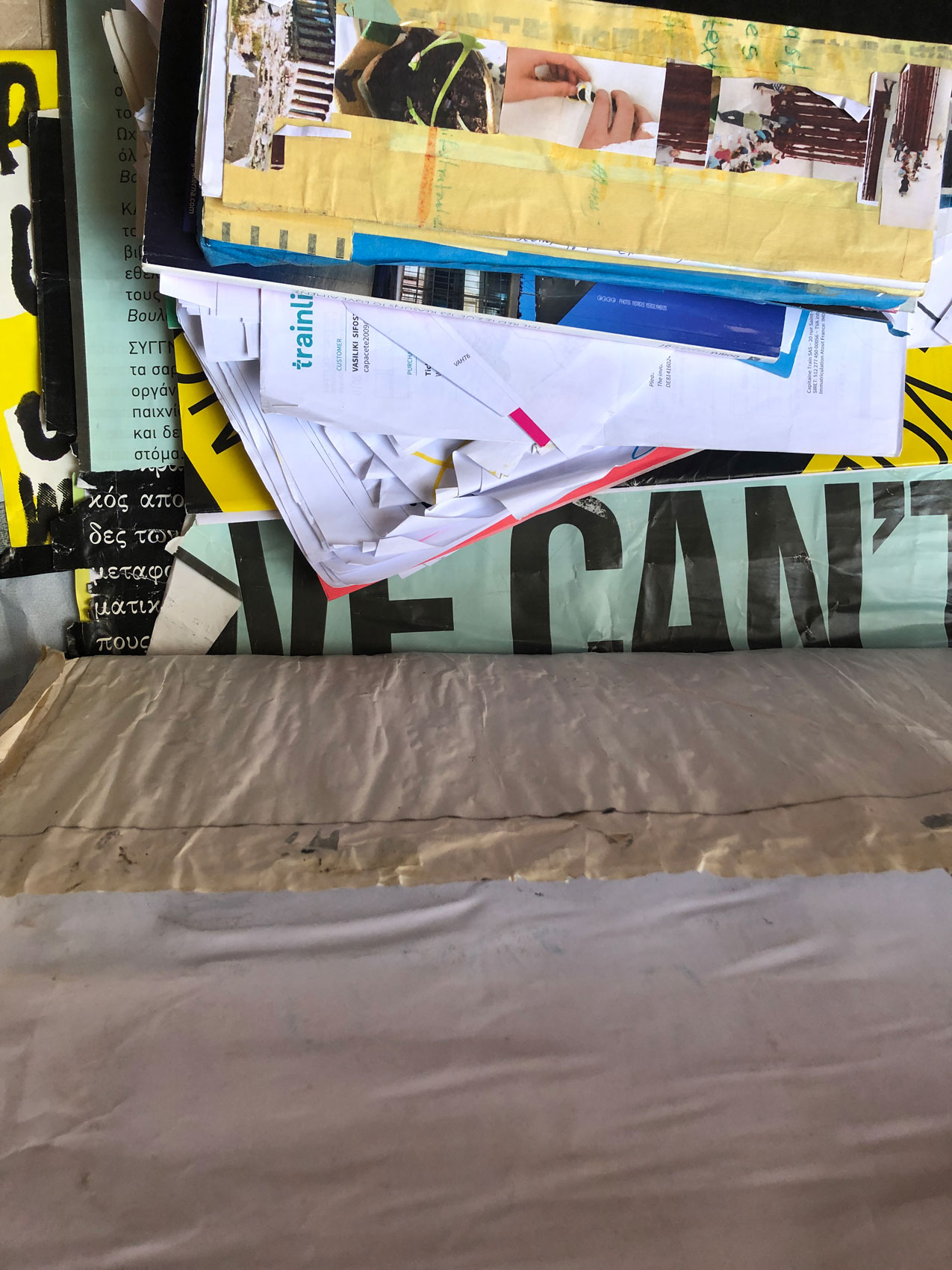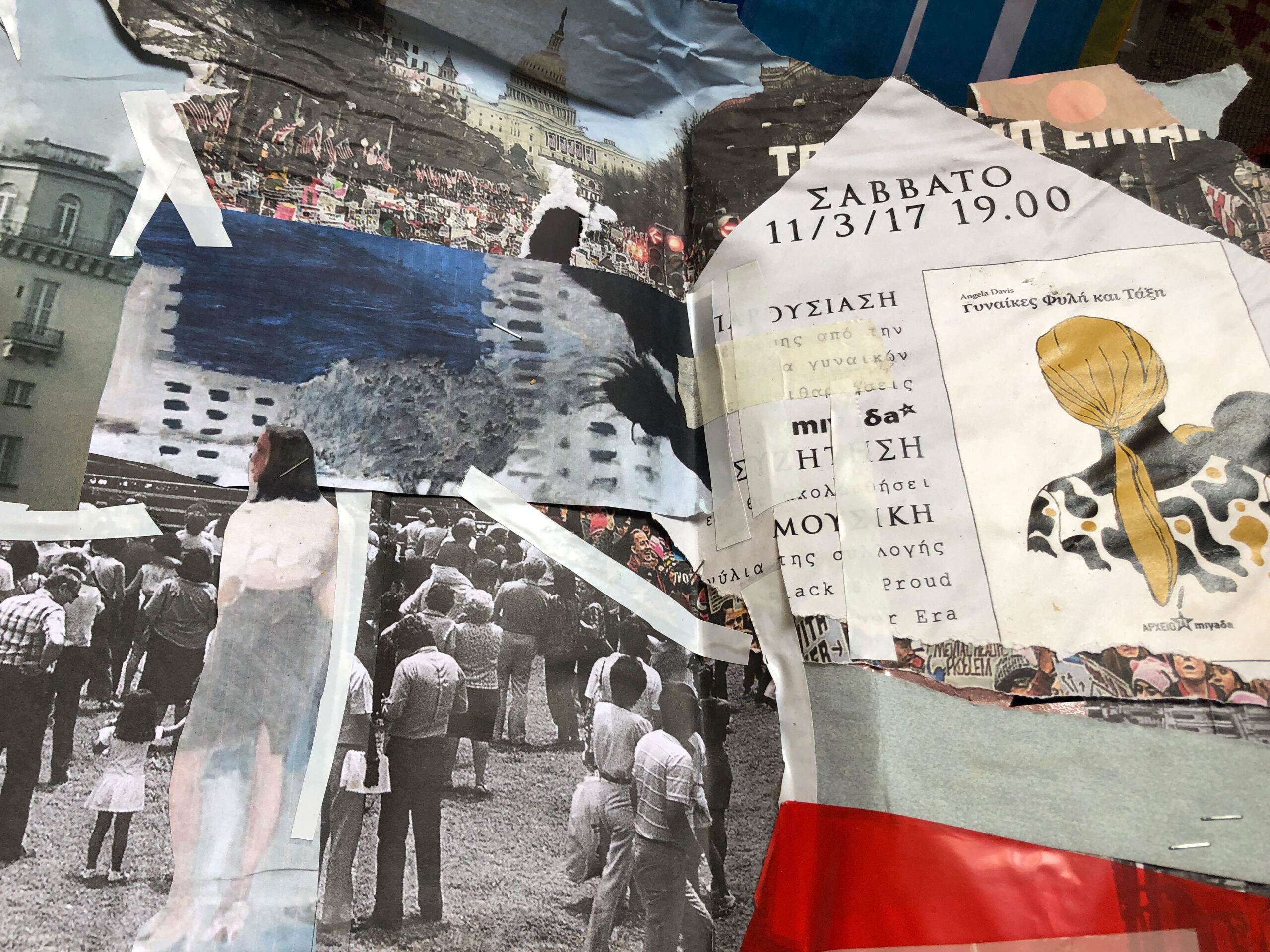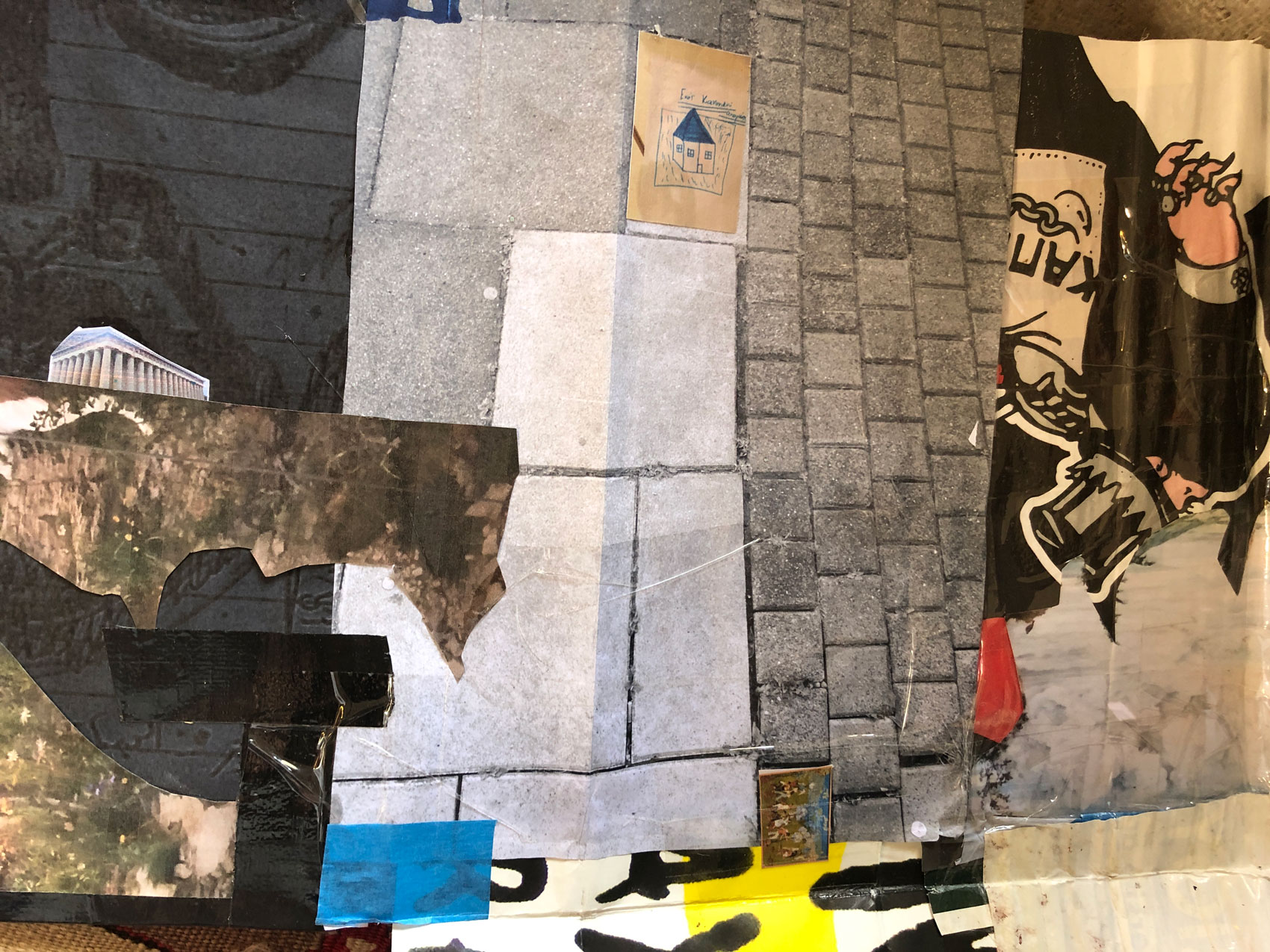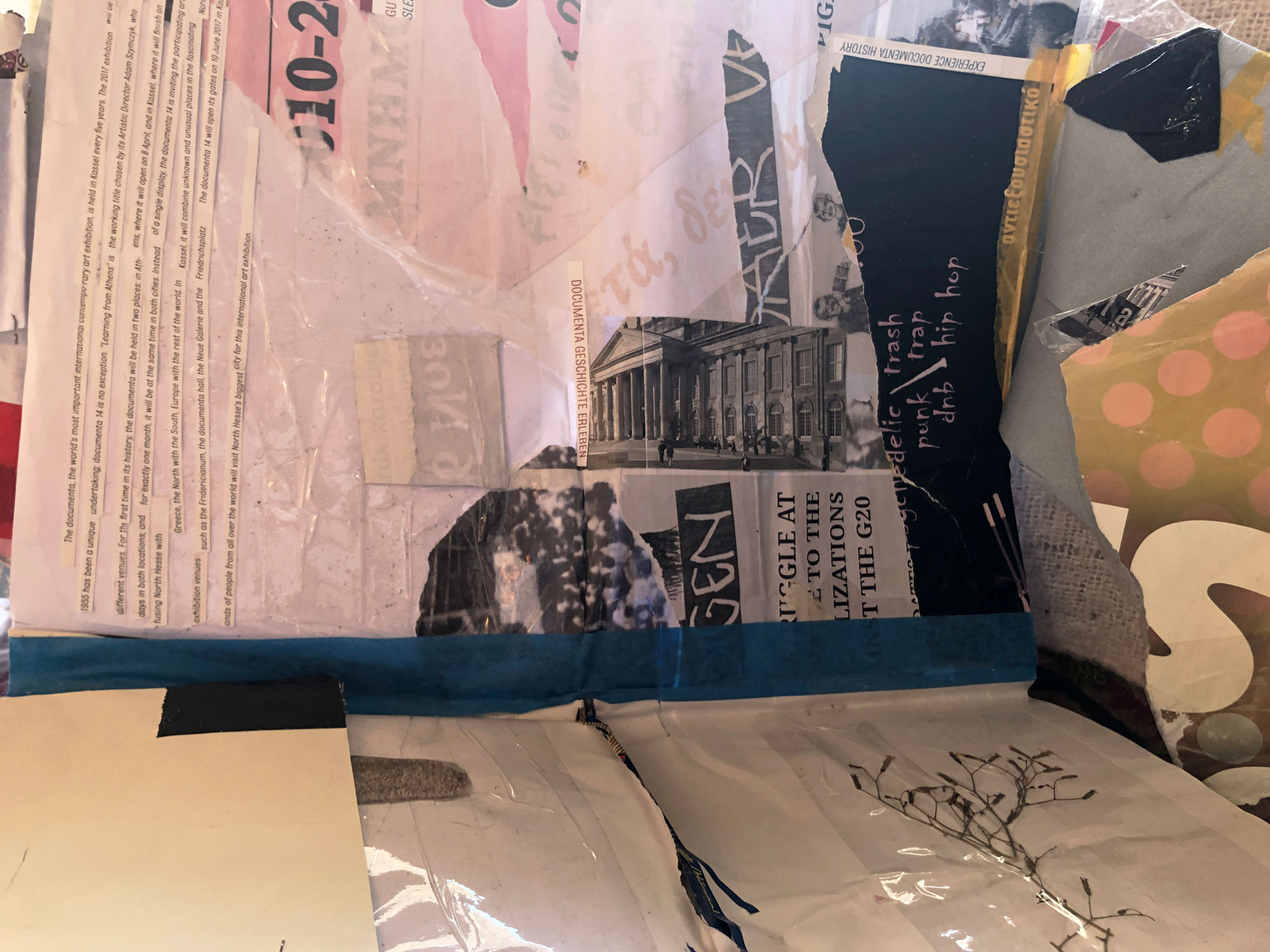‘I forgot my title’, 2020
I try to write about a work of mine whose title I don’t even remember and I realise that it was an exercise of a mnemonic reservoir rather than a work. At the time I had a desire to navigate between the feeling of my disorientation because of the volume of information coming at me and the demand it produced for continuous learning and movement. It happened at the same moment as documenta14, and I was already affected by the fact of my return to Athens after being away for three years. ‘Unlearning’ became my model, a way of simplifying the whole confusion and a way to think through the idea of my own awareness of knowledge, and a way of suggesting that knowledge is still a compass for the undoing of known patterns of registration. Would forgetting-messing up be the suggestion of what I was invited to do? Perhaps an undiscovered verb could be found.
drawings of children made during the walks of the chorus of documenta14
posters of art events
mass produced posters which were at that time in the streets of Athens and Kassel
images of advertisement stands related to documenta14 in kassel
tickets
text from the exhibitions
left overs of posters and tapes in the streets of Kassel and Athens which could be connected or not with the exhibition
maps of the cities
catalogues and programs of the exhibition
maps of the venues
stickers
some plants
Paper collected in an anarchic ritual of mapping my way; a habit that I have practiced since a very early age and which still continues today. Filling my pockets through the mass of information, different activities and models I am involved with, and the unending movement demanded of us in order to see, listen, and experience the city and documenta14 between Athens and Kassel.
An obsession to discover where and how people, and I, am informed about it. How can I attach to it? How does an exhibition affect the landscape of the city? Does it follow the formats of the city, are its aesthetics different? The piling up of material and the action of having to throw away ‘the papers’ several times composed the fact that I was making up a collection. Along with this, conversations with people I knew and then random ones like with the taxi driver constantly complete my effort to understand if Athenians are aware of the art explosion that is taking place in the city.
A subjecting – mnemonic reservoir – a reflective tool that starts from the visual and goes toward the narrative to recall its embodiment and tries to connect the dots.
New layers are added from navigating my way through the cities. I travelled to Kassel to see what was already seen in Athens. What made everything different was the suggestion to travel, to see, to meet, to dance, to experience the necessities, to have, to choose, to move, to go.
A continuous movement which adopts emigrating behaviour/αποδημητική συμπεριφορά where the narration of history is always left to the teller-speaker-storyteller’s assemblage. Where the fact of being/γίνεται is taken up from a condition of not belonging or not being able to make your own landscape each time. Does that artist today, the one who has to act out moving so often while travelling for residencies and commissions, find it hard to connect when they are always the visitor and never the guest or the host?
Here I would like to give you an image: Sokol Beqiri, grafted an oak in the Athens Polytechnic garden to an oak planted by Joseph Beuys in Kassel in 1982 for the work Adonis (2017).
To perceive and make sensate the movement a tactile moment is held: I collect. Starting from the visual and expanding to the gesture I now end up with a pile of papers back in my house and in my studio, in my bag and jacket.
‘Random’, becomes the manner to archive.
During the presentation of the ‘Learning from Documenta’ conference I forgot my title is set up as an installation, mimicking the placement of posters in the streets of Athens and Kassel. Parts of it are made into a performative tool, a book, a collage of found papers which one or more people could unfold in various ways to navigate through the chaotic sequence of the text written on it. All the decisions are driven by the visual aspects.
Several attempts of archiving implied and revealed the establishment of a hierarchy between aesthetic, organisational (mapping), informational matter and the importance of the events illustrated in the found printed matter, as well as the children’s drawings documenting the ‘walks’ in the EMST (National Museum of Contemporary Art) where I was working as a guide (chorus member) for documenta14.
‘Random’
body
As I could never escape the aesthetic in the sense of stability, organization and history, I try to disturb often with practises that diminish the value of its beauty/ωραιότητα and imply an involvement. We grew up in a country that was only recently going out of dictatorship and was trying desperately to attach to the WEST.
Nursed/γαλουχηθήκαμε inside our dreaming of the WEST was at the same time an idealisation of our ancient past, whose ideals had supposedly constructed its foundations. The pathos of the marbles – which mean nothing other than an eternal endurance and preservation – still surround my everyday walks from my sink to the monuments. While I still παραπαίω/stagger in a normality that is neither southern mediterranean nor west european, from where I stand I try to think of a possible visual identity in which I could be. Nor in the one that I was dreaming and romanticising, neither in the oppositional one. Not in the title that is often attached to my profile today, one dot is in Byzantium and the other one in Balkans, I don’t know this place because it was never here.
But the one of a verb which is becoming a noun and never articulated, but like a sound of a flavor can amplify involvement and feelings. A verb which is like a mnemonic reservoir piles up: learning as a container of experience, unlearning, resting and caring for the choreographing of the body’s involvement.
I forgot my title is manifested in an installation, an artist Book as part of Learning from documenta conference, 2018 and the text with the same title.
With thanks to Liz Allan for her editorial engagement.




